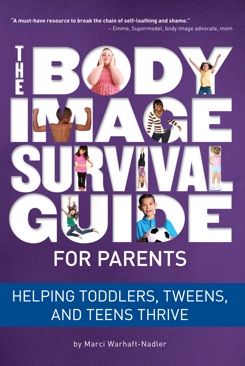 Feb. 11, 2014 Long after the Olympics leave a wistful wake among those of us reveling in refreshingly positive storytelling, there will be ‘teaching moments’ that stick to our souls.
Feb. 11, 2014 Long after the Olympics leave a wistful wake among those of us reveling in refreshingly positive storytelling, there will be ‘teaching moments’ that stick to our souls.
Parenting primers like “What Kids Will Remember Forever From Watching the Olympics With You” help kids explore backstories, inspiration, competition, geography, and even seed some critical thinking surrounding controversy and ads…
…But what’s missing?
Health literacy.
Specifically, the emerging public health problem of body image, sexualization and appearance based cues impacting children’s wellness and self-perception.
To kick off the week on a positive note, I’ll point to the powerful performance of “sheroes” like Jamie Anderson, the first woman to win gold in the first ever snowboard slopestyle race, a four-time X Games champion at 23 who turned pro when she was just 13!
Watching Jamie Anderson’s prowess brings a whole new meaning to ‘chill’ as she exudes her own signature strength and style, inspiring young girls to carve out their own identity with the prowess of an athlete blending fun, friendliness and fixation on delivering her own personal best. (Visual credit: Mike Ehrmann/Getty Images via L.A.Times)
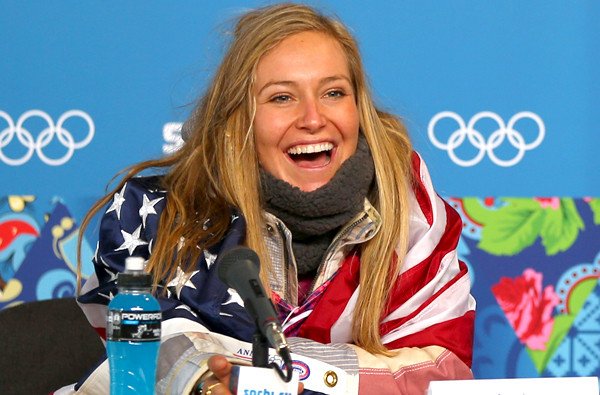 In a parenting world desperate for healthier media messaging and role models for girls, I found myself giddy with hopefulness that Jamie would evoke history-making moments reminiscent of summer Olympics gold medalist sheroes like Gabby Douglas and Missy Franklin who always managed to flip the media script back to their speed/agility, performance and mental/physical acumen drowning out the hype of merchandising opportunities and exploitation in favor of being themselves, with all their indie-spirit, personality and authenticity shining through as bright as their ‘gold.’
In a parenting world desperate for healthier media messaging and role models for girls, I found myself giddy with hopefulness that Jamie would evoke history-making moments reminiscent of summer Olympics gold medalist sheroes like Gabby Douglas and Missy Franklin who always managed to flip the media script back to their speed/agility, performance and mental/physical acumen drowning out the hype of merchandising opportunities and exploitation in favor of being themselves, with all their indie-spirit, personality and authenticity shining through as bright as their ‘gold.’
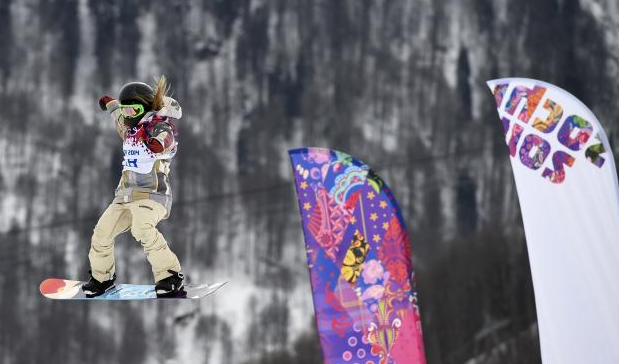 With body image, it’s always helpful to redirect visual cues away from exterior imagery to show and tell the true power of a woman’s body, and Jamie’s raw feat on the slopes is blade sharp purity when it comes to conveying daring, cutting edge performance. (visual credit: Dylan Martinez/Reuters)
With body image, it’s always helpful to redirect visual cues away from exterior imagery to show and tell the true power of a woman’s body, and Jamie’s raw feat on the slopes is blade sharp purity when it comes to conveying daring, cutting edge performance. (visual credit: Dylan Martinez/Reuters)
I scoured the net in a quick click game of “Olympic athlete cheesecake dodgeball”…
…muttering to myself, “PLEASE , let there be no Google gaffes, Jamie Anderson!”
It’s an all too pervasive phenomenon of iconic champions in sexualized, objectified poses, whether it’s skiers posing pin up style in bikinis in the snow or racy kids role models as NASCAR drivers straddling car engines in thongs…
Thankfully, nothing but wide grin smiles and amazing action shots as the gold medalist snowboarder smoothly sailed through the air, yay!
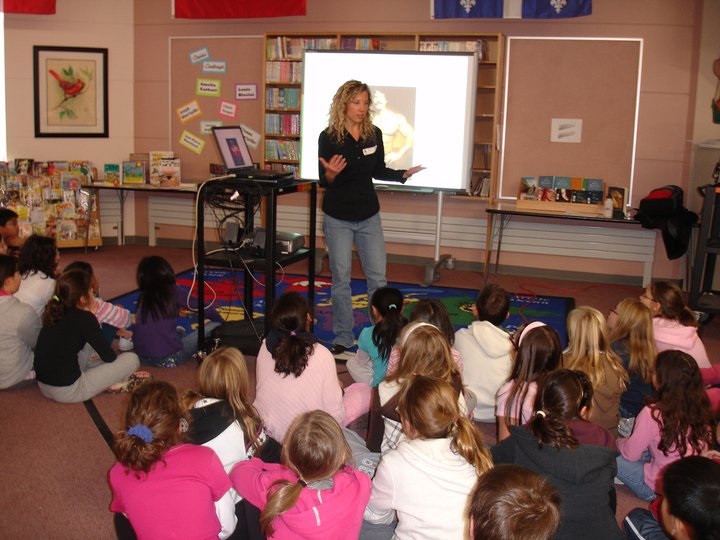 I cannot BEGIN to tell you how hard it is to explain to an excited group of little girls applauding triumphs of sports “sheroes” with aspirations to ‘be just like them’ only to have crestfallen little faces ask
I cannot BEGIN to tell you how hard it is to explain to an excited group of little girls applauding triumphs of sports “sheroes” with aspirations to ‘be just like them’ only to have crestfallen little faces ask
“But why do they have to take their clothes off all the time?”
Good question, kiddies…(I’m sure Marci Warhaft Nadler, author of The Body Image Survival Guide for Parents, shown at left would agree)
This is not a “sweep it under the carpet” change the channel conversation…(nor is it troll bait, hold the ‘pearl clutching prude’ accusations/commentary please)
This is about kids wellness…pointing toward the pervasive, damaging, widespread public health issue which we need to feed with positive prevention among both girls AND boys when appearance is nudging out all other aspects of children’s identity and self-worth and we need to think critically about the role of media messaging.
The Onion posted a sardonically sad but true bit of wit on this very topic titled, “Lolo Jones Becomes First American to Be Objectified in Both the Winter AND Summer Olympics.” As the kids might say, “Funny, but not funny.” Sooooooo…
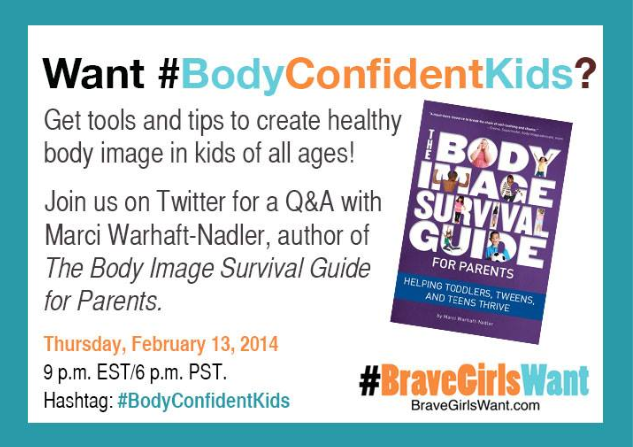 We’ll be tackling health literacy today, and all this week posting about Olympic athletes and body image updating our summer Olympics interview with Fit vs Fiction’s Marci Warhaft Nadler who shares talking tips with kids to uncork sticky subjects and redirect some wince-worthy observations…
We’ll be tackling health literacy today, and all this week posting about Olympic athletes and body image updating our summer Olympics interview with Fit vs Fiction’s Marci Warhaft Nadler who shares talking tips with kids to uncork sticky subjects and redirect some wince-worthy observations…
…Like the recent viral views routing through teen social media shares involving Russian Olympians sexualized as eye candy to “defy the stereotype that women in sport are just a heap of muscles and masculine shapes.” (ugh. So many kinds of wrong there, I just don’t know where to begin.)
Then, the day before Valentine’s Day, to give an extra dose of ‘love’ to our bodies for what they DO for us, colleagues and partners in the Brave Girls Alliance will be hosting a Twitter chat on Feb. 13 about “raising body confident kids” (6pm PT/9pm ET).
Marci, author of the new book “Body Image Survival Guide for Parents: Helping Toddlers, Tweens and Teens Thrive” will host and help sort out the toughest ‘teaching moments’ from the triumphs, giving usable take home tips.
Jamie Anderson’s outdoorsy, fort-building, Lake Tahoe family fun/naturalist appeal so far falls into the triumphs category, with blurbs from her site,
“Ever since I can remember, I’ve been outside playing, building snow forts, sledding, hanging out at the lake, hiking and camping in the mountain, and just exploring this beautiful EARTH!… When I was nine years old I was given the opportunity to snowboard for the first time ever, and absolutely fell in love with the sport! Being on the mountains, the energy, the trees, exploring different terrain, just everything snowboarding had to offer inspired me.”
 When I saw she had a new photo shoot as part of the “P&G family of products” with a beauty/fitness focus I winced at first, then saw it was benign, for Olay “Fresh Effects,” hashtagged “Beauty In Action”…
When I saw she had a new photo shoot as part of the “P&G family of products” with a beauty/fitness focus I winced at first, then saw it was benign, for Olay “Fresh Effects,” hashtagged “Beauty In Action”…
Thankfully, it was all just more “ripping up the slopes” vs. “ripping off the clothes” so it landed on me as a ‘spot on’ descriptor “yep, Beauty in Action, Jamie just ‘doing her thing.” Boom. Nailed it. Smooth landing…
Unlike the deflating pinup pose photos which trounce tween and teen psyches by hijacking sports performance prowess to degrade women’s value and worth into visual eye candy, athletes with deals that ‘fit their brand’ use the endorsements rather than endorsements using them. Yes, athletes, you CAN have it both ways. You can be comfortable in your skin without having to sell it. That’s my thought anyway…
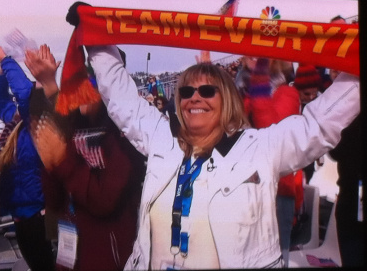 Score one for the athlete Entertainment Weekly dubbed the “Jennifer Lawrence of the slopes” for her likable, unflappable, easy going manner…In fact, even when besieged by media hounds in way too ‘up close and personal’ feeding frenzy, EW described,
Score one for the athlete Entertainment Weekly dubbed the “Jennifer Lawrence of the slopes” for her likable, unflappable, easy going manner…In fact, even when besieged by media hounds in way too ‘up close and personal’ feeding frenzy, EW described,
“She turned to the camera and just said: “Russia’s been beautiful. The course was so fun. Life is good!”
And amidst all the flag-waving nationalism and “Team USA” fixations, EW also added,
“And Jamie’s mom proudly waved a big red-and-yellow scarf which said TEAM EVERY1… Her daughter just won a gold medal, and she was rooting for everybody! Guys, I think the Andersons have come down from heaven and/or Tahoe to save us all.”
Of course, media can’t resist the shortcut to typecast with a quick handle for storytelling, so Jamie’s already being cast as a granola chomping, candle-lighting, yoga loving, Zen-inspired ‘hippie’ as reporters pounce on Jamie’s mom’s description of her daughter as a “tree-huggin’, fun-lovin’, down-to-earth medicine woman”…Her good-natured, ‘one world’ attitude of interconnectedness distills into a bumper sticker philosophy on Jamie Anderson’s Tumblr blog and web site:
“Love. Life. Friends. Snowboarding.”
And for now, that feels very real and natural, like an outdoorsy Lake Tahoe California girl speaking not a public relations pundit. From a body image and performance stance, so far Jamie Anderson is refreshingly natural; my marketing dream for her is to cast off some dead weight sponsors like Monster that mar her vast potential for a clean slate of healthy positivity for kids. Wouldn’t it be cool if she could educate how she gets her energy through her upbeat karma with friendships and yoga, focused calm?
Here’s Marci with more on how Olympic athletes and body image messaging and merchandising impact kids’ health and wellness. Do mark your calendars for the tweet chat Thursday Feb 13. I’ll chime in too.
Amy Jussel, Shaping Youth: Marci, how do we best take hold of the ’20 sexiest athletes’ types of conversations and flip the message to performance over sexploitation to quell the ogle-fests? What impact does this have on kids and how can we best deconstruct it while co-viewing to curb damage to body image/self esteem?
 Marci Warhaft-Nadler, Brave Girls Want Partner, Fit vs Fiction Owner, and Author of Body Image Survival Guide for Parents:
Marci Warhaft-Nadler, Brave Girls Want Partner, Fit vs Fiction Owner, and Author of Body Image Survival Guide for Parents:
I am constantly amazed at how different the media coverage is between male and female Olympians.
In that CBS slideshow, they referred to figure skater Ashley Wagner and Alpine skier Julia Mancusa as “Ski Bunnies,” inviting readers to share their thoughts on the “hotness” of the competitors, all while of course, neglecting to mention what it really takes to become an Olympic athlete.
To prepare, Julia participates in activities like surfing, paddle boarding, cross training, strength training and running, while Ashley trains 5 days a week, for 22 hours within the week and also does yoga, swims and lifts weights.
It is completely disrespectful to the athletes to make how their bodies LOOK a priority over how they work.
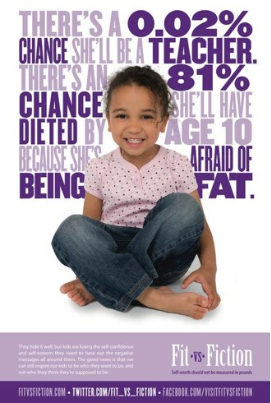 The Olympic Games SHOULD be the perfect opportunity to inspire girls to get off the sidelines and into the game, but instead of messages of strength and encouragement, they’re being told through subtle and not so subtle messages through countless ads and articles, that they’re welcome to join in, BUT only if they’re as attractive as they are skilled. According to the women’s sports foundation, by age 14, girls are dropping out of sports at two times the rate of boys and that’s just not okay.
The Olympic Games SHOULD be the perfect opportunity to inspire girls to get off the sidelines and into the game, but instead of messages of strength and encouragement, they’re being told through subtle and not so subtle messages through countless ads and articles, that they’re welcome to join in, BUT only if they’re as attractive as they are skilled. According to the women’s sports foundation, by age 14, girls are dropping out of sports at two times the rate of boys and that’s just not okay.
Ask your child:
What do you think it takes to get to the Olympic Games?
What kinds of characteristics do these athletes need to possess in order to be as successful as they are?
What do you think they are most proud of when they are standing on the podium?
Redirect the conversation to talk about how each body part plays a role in their success. For example, skiers need very strong legs and skaters have a lot of core strength to help with balance.
It’s also important to mention that there are some situations where athletes may push themselves PAST a point that is healthy and that it’s necessary to understand that we’re just seeing a portion of what they do to look the way they do. While strength and health should be the goal of all athletes, some can be led astray or fall victim to the pressure their under with dangerous results.
I’d keep the subject age appropriate, but it’s apropos to note that Olympic figure skater Akiko Suzuki battled an eating disorder while competing and was forced to take some time off from the sport to recover before starting to train and compete again.
Discuss why it’s important to always put your health first and how important it is to ignore advice when it really doesn’t feel like it’s in their best interest. Ask: Have you ever been given advice by someone that you weren’t comfortable with? What did you do?
Amy Jussel: Do you have specific tips in your book for parents to draw from to intervene on their child’s behalf or is it more about opening up conversations with the child directly?
 Marci Warhaft-Nadler: Both. In my book I talk about the benefits of encouraging kids to participate in sports, beyond strengthening muscles, it can also strengthen self-confidence and self-esteem.
Marci Warhaft-Nadler: Both. In my book I talk about the benefits of encouraging kids to participate in sports, beyond strengthening muscles, it can also strengthen self-confidence and self-esteem.
There’s a flip side to that with bad coaches which is a different but important topic, because as parents, we have a lot of influence on our kids, but there are other people in their lives (teachers, coaches) who ALSO have an impact on how they feel about themselves. To gauge their stance on how your child’s well-being ranks against athletic success, ask your child’s coach:
How important is winning to you? What will my child learn from this experience? If I have questions or concerns, how can I reach you? What type of supervision is provided? How can I help?
Amy Jussel: Talk to me about the body image lens on self-objectification positioned as ‘empowerment?’
What about the argument that it enhances “visibility” for their sport? (e.g. Lindsey Vonn/bikini snow shoots, RedBull merchandising/pin-up poses)
Marci Warhaft-Nadler: When high profile female athletes choose to go (nearly) naked for commercial gain, the argument put forth is usually that since female athletes get just a fraction of the media coverage male athletes do, sex appeal is a way of getting them the attention (or money) they deserve. I’d ask, “But is THAT kind of attention helping or hurting female athletics?”
Putting sex appeal before skill doesn’t highlight their athleticism; it just reinforces the idea that women’s bodies are less about function and more about fantasy.
I also don’t agree with the “but it’s empowering!” argument. What’s empowering about athletes doing what supermodels have been doing for years? Empowerment doesn’t come from choosing to do what’s expected, it comes from using your position of influence to send a strong message about self-respect.
Finally, time and again we see male athletes allowed to be strong, competitive and aggressive, while female athletes can be skilled, but also need to be attractive, sexy and “feminine”. While this may seem like “no big deal” to a lot of people, it’s actually a very big deal as it’s negatively impacting the self-esteem of our daughters while sending the fallacious yet consistent message to our sons that the most important thing a girl can be is pretty.
Amy Jussel: What impact does it have on other female athletes? Boys and girls? How would you use media to change the course of that conversation? And do you see objectification and body image scaling to the size of a public health problem?
Marci Warhaft-Nadler: The message here is that above all else, women need to be beautiful and beautiful women come in a very limited amount of shapes and sizes. Why is this damaging? Our girls are being told over and over again that they’ll always be judged on how they look and they’ll grow up feeling that they’ll never measure up.
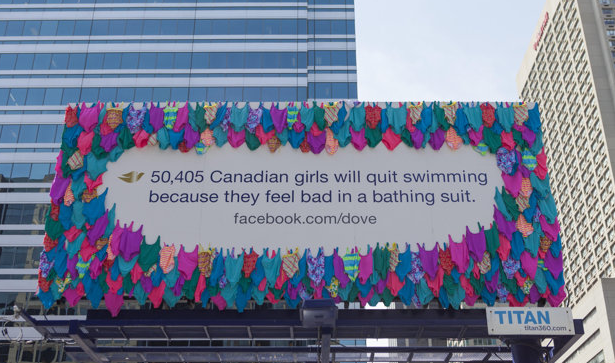 There are very real impacts both physically and psychologically, that actually deter participation in sports…
There are very real impacts both physically and psychologically, that actually deter participation in sports…
Look at the Dove research and billboard
“50, 405 Canadian girls will quit swimming because they feel bad in a bathing suit.”
Granted, that’s Dove’s marketing campaign to promote self-esteem, but I see this repeatedly with girls in interviews throughout my book.
Crystal is a 15 year old martial artist that I interviewed, for example, and she explained the frustration she felt being surrounded by girls at school her constantly complaining about their bodies and how much weight they wanted to lose, yet refused to do any physical activity because, “They didn’t want to get sweaty and look gross.” Instead of engaging in physical activity they just cut out meals and tried to starve themselves into the bodies they thought they were expected to have. Kids as young as 5 years old are being treated at Eating Disorder clinics because society and the media are teaching them to wrap their entire self-worth around how they look.
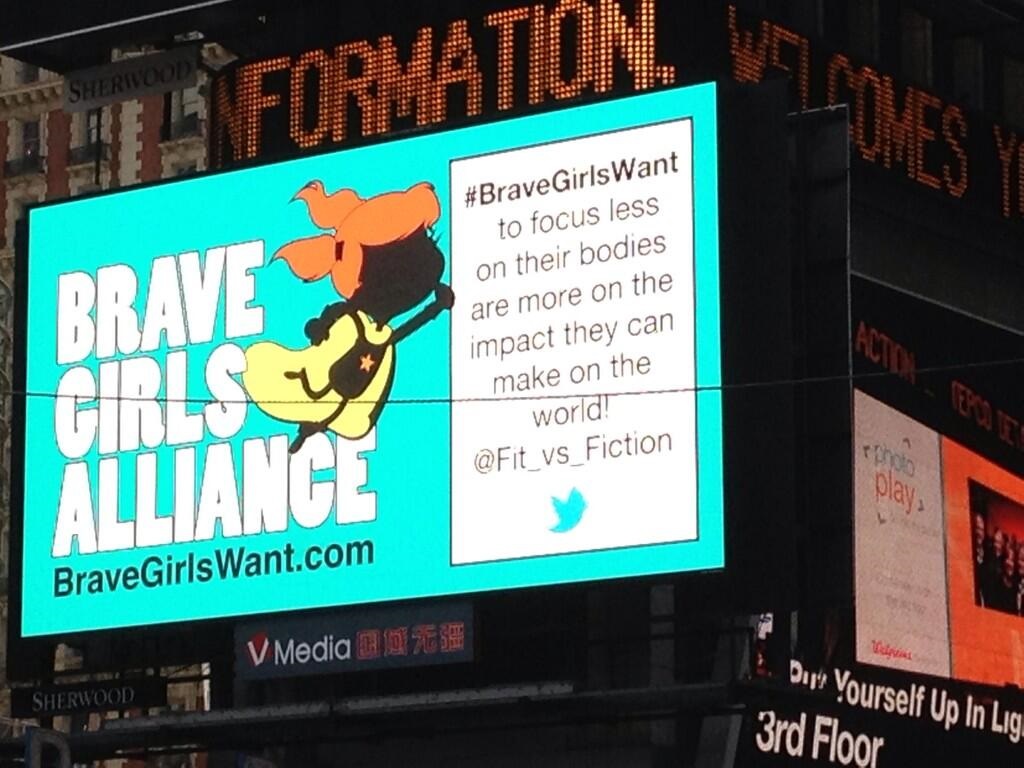 It’s crucial that we provide them with role models who are encouraging rather than demoralizing.
It’s crucial that we provide them with role models who are encouraging rather than demoralizing.
So yes, I DO see this as becoming a public health problem. And I think raising awareness on the net with the #respectsportswomen and #NotBuyingIt hashtag to call out double standards in Olympics media reporting and body image blunders is a good start.
For tips: Take your daughter to watch female sports teams in action! It can be as simple as going to a community soccer game and watching local kids playing in a recreational league.
The point is to let them see that girls of all shapes and sizes can play sports and have fun. Go to the library and find books ( or search the internet) about women who have been pioneers in their sports and discuss what it took for them to be successful.
Examples: Janet Guthrie was the first woman to compete in the Indianapolis 500 and the Daytona 500 in 1977
Althea Gibson was the first black player—man or woman—to play at Wimbledon in 1950.
Billy Jean King championed the women’s tennis tour founding the WTA in 1973
Marie Wilson, Founder and President Emeritus of The White House Project, said it perfectly “You Can’t Be What You Can’t See.”
(Amy’s note: Miss Representation and The Illusionists documentaries both tackle body image portrayals wonderfully well, and Media Education Foundation is chock full of resources along these lines, like Playing Unfair, and excellent critique of the treatment of sports women through the media lens.)
Amy Jussel: I know we’ll talk about body image as ‘entertainment’ genre in another post but for now, if YOU were still competing, (esp in a body focused sport like weightlifting!) how would you best redirect a media microphone in the face w/a sexist Q directed to you on the spot? (e.g dumb or insensitive questions endured by female athletes like the horrific Beth Tweddle/Eugenie Bouchard media scenarios)
Marci Warhaft-Nadler: Ask your daughter: If you had the chance to interview a female Olympic athlete, what questions would you ask? Sadly, I don’t think we can sit by and wait for female athletes to be respected; we need to demand for it to happen.
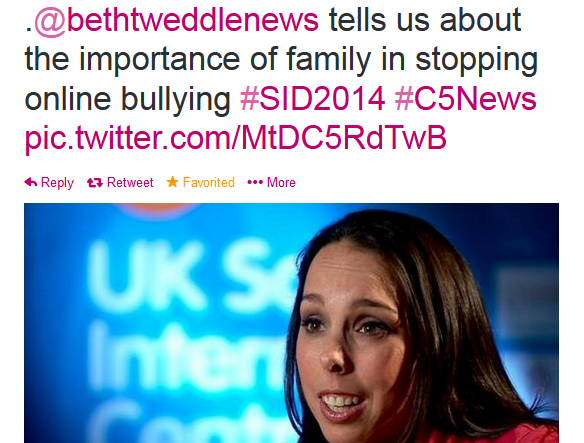 How can expect young girls to even try to get involved in sports if they’re going to afraid of the backlash we’ve seen recently, like in the case of Beth Tweddle. Men just don’t get treated that way.
How can expect young girls to even try to get involved in sports if they’re going to afraid of the backlash we’ve seen recently, like in the case of Beth Tweddle. Men just don’t get treated that way.
During Beth’s Twitter debacle, she was inundated with hurtful, disgusting comments about her looks. Why is that people felt justified in criticizing how she looked? Maybe it’s because we’ve set our athletes up for this kind of scrutiny.
(Amy’s note: And maybe it’s because we need to teach early and often about the force field of “upstanding” to pushback against trolls…Today is “Safer Internet Day” and Olympian Beth Tweddle has championed change in this arena speaking out boldly to reach millions about bullying and offering her own experiences to school kids everywhere!)
Marci Warhaft-Nadler: When Tennis champ, Eugenie Bouchard was asked after her incredible performance at the Australian open, “If you could DATE anyone in the world, who would you choose?” I wish she had been given some time and (preparation) to be able to deliver an answer that would send a strong message. How about, “I am really proud of what I just achieved and to be honest, am not thinking of dating right now.” Or “I’ve just spent months training and working really hard to compete here and just want to celebrate with my friends and family.”
For hours, spectators watched Eugenie compete like a champion and with one question, reporter Samantha Smith treated her like a giggly teenage girl with a crush on Justin Bieber. Was there really no better question she could have asked? Would she have asked a similar question to the men who were competing? Would they have answered if she did?
I wish Eugenie would have known that it would have been okay to refuse to answer the question and let the reporter (and the girls watching in the crowd and from home) know that they deserve better than that. Women in sports need to stand up and demand respect.
Amy Jussel: Yah, it’s hard to be caught off guard…Sometimes a quizzical look or an “Excuse me?” just letting the absurdity of the question hang in dead air adds the ‘whaaa?’ context and ‘aha’ moment for critical thinking that everyone needs. It’s so hard in the media crush when an athlete is bombarded and under siege probably thinking, “Really? Did they really just ask that?”
This is why I choose not to DO media. I stay behind the keyboard because I’d say straight up what was in my head…no filter, in ‘yougawdabekiddinme’ mode…And I’m not an athlete with mega-endorsements at stake riding on my verbiage. The pressure must be immense.
Thanks Marci, for your time today, looking forward to talking with you more throughout the week and of course on Thursday at your Twitter chat. Feb 13, 9ET/6pmPT Follow the #BodyConfidentKids hashtag, along with Brave Girls Alliance partners like Nancy Gruver, Carrie Goldman, Rebecca Hains, Melissa Atkins Wardy, Melanie Klein, Lori Day, Elizabeth Sweet, Erin McNeill, yours truly, Amy Jussel, and many, many more.
RSVP event page on FB if you want to see who else is participating on Twitter Feb. 13, 2014 Important topic!
Meanwhile, here’s to sorting through the Sochi 2014sports coverage…For more conversation starters with kids, don’t miss our summer Olympics post about body image too.








Speak Your Mind